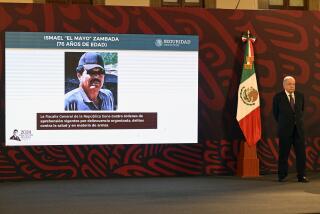End Private Banking Loopholes
- Share via
The General Accounting Office, the investigative arm of Congress, has issued a disturbing report on an alleged money-laundering scheme involving the brother of former Mexican President Carlos Salinas de Gortari and the American banking giant Citicorp. The report raises serious questions about this nation’s willingness and ability to detect and deter illegal financial transactions.
The GAO investigation was triggered by three questions posed by Sen. John Glenn (D-Ohio):
--How did Raul Salinas, currently jailed in Mexico on charges of murder and illegal enrichment, transfer $90 million to $100 million from Mexico to secret bank accounts in Britain and Switzerland?
--Did New York-based Citibank assist Salinas in the money transfers?
--If the bank did help, were any U.S. banking laws violated in the process?
The results of the inquiry are worrisome. Despite the notoriety surrounding the Raul Salinas case in Mexico, the GAO found no evidence that Citibank broke any rules in designing an elaborate scheme to help Salinas get large amounts of money out of his homeland. The Justice Department is still investigating the case.
To assist their wealthiest clients, many banks eagerly provide so-called private banking, and it’s a far cry from the service most account holders can expect. Bank officials who oversee those accounts develop a biographical profile of each private client to ascertain identity, credit and character and to help verify the origins of the cash they are handling--specifically, to certify that it is not stolen or the result of illicit activities like drug smuggling.
The complicated pathway of Salinas’ money, according to the GAO report, involved using shell companies and shuffling the money around the globe. One stop was a Citibank affiliate in the Cayman Islands, a notorious tax haven, and at another point Salinas’ wife used a false identity to send funds through Citibank Mexico to Citibank New York, then to the Caymans.
It is hard to figure out a reason for all this movement except to conceal the identity of its owner and to disguise the source and destination of the money. The GAO concluded that it could not determine that laws or regulations were broken. Federal banking overseers have yet to find fault with Citibank. If all this “service” was legally available to Salinas, what might be possible for equally rich Americans seeking to cut their tax bite?
In Mexico, meanwhile, the Salinas case has been an acute political problem for many, and now it is an embarrassment for Washington. Congress should take a long hard look at the evident loopholes in U.S. bank laws and seal them. Then perhaps the United States can return to hectoring other nations about money-laundering.
More to Read
Sign up for Essential California
The most important California stories and recommendations in your inbox every morning.
You may occasionally receive promotional content from the Los Angeles Times.










